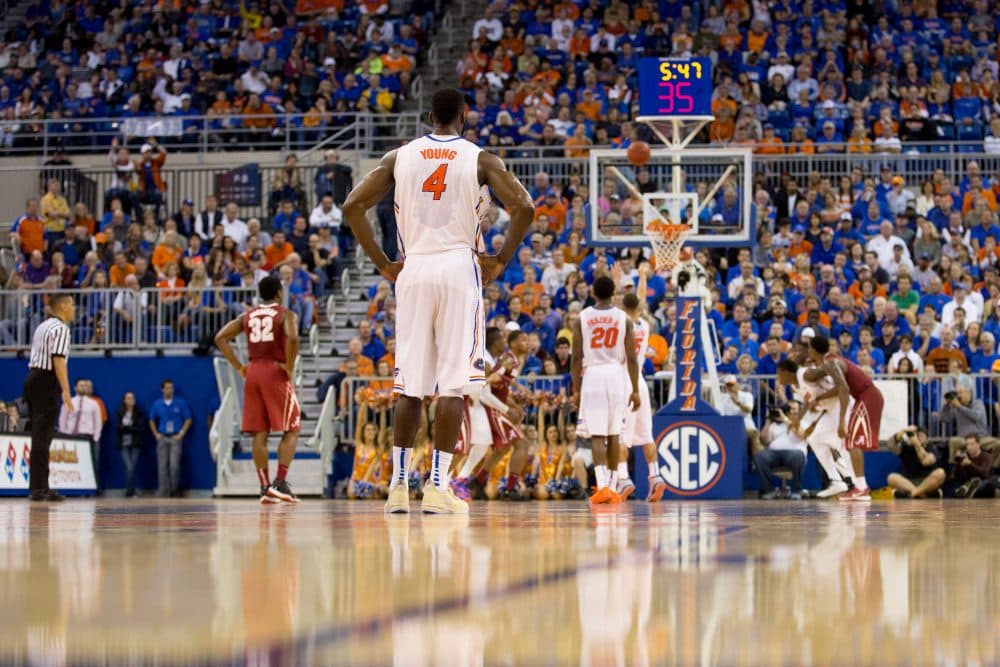Advertisement
A Mensa Member's Decade-Long Quest To Fix Basketball

Want more Only A Game? Follow along on Facebook and Twitter.
There are two things you need to know about Nick Elam: he's really smart (he's a member of Mensa) and he really cares about sports.
Back in 2003, when Elam was an undergrad at the University of Dayton, he needed a summer job. Instead of bagging groceries or delivering pizzas, he applied to join the grounds crew for the local minor league club — the Dayton Dragons.
"They called me in for an interview, but really it was just kind of a tour," Elam says. "I basically just had the job. And did that for three years and loved it. But then I thought, 'You know what? I might be ready for the big leagues at this point.'"
So Nick Elam called the head groundskeeper for the Cincinnati Reds. Elam’s now in his 12th season with the club.
"There's a lot of very skilled and knowledgeable people on the Reds’ grounds crew," he says. "I am not one of them. If you were to rank us by our groundskeeping skills, I'm not sure I'd be in the top 20. But I've got spunk, so that's what I'm there for."
You might wonder why a guy in a high IQ society still spends 50 nights a year dragging around bags of dirt or pulling a tarp over a baseball field.
"It's unbelievable. This guy's been spending 10 years on this concept. And he's a genius."
Jonathan Mugar
"It's just exciting to play a very small part in the experience of the game," he says.
Elam doesn't devote all his time to grooming baseball diamonds. He works as a middle school principal. He just completed a PhD in educational leadership. And he's trying to change basketball.
"To be honest, my highest hope for this idea is that it's adopted at every level of play and that it will be remembered where one day I'm being inducted into the Basketball Hall of Fame in Springfield, Massachusetts," he says.
But let's start at the beginning.
'It's Just Ugly Basketball'
It's 2004. Nick Elam's promising groundskeeping career has just begun. And on a Sunday in late March, he and his housemates are sitting together on the mismatched furniture in their cramped living room watching the NCAA basketball tournament.
There’s a tight game between Duke and Xavier. With less than three minutes to play, Duke takes a three-point lead.
Then the game starts to slow down.
Duke point guard Chris Duhon dribbles the ball 35 feet from the basket, trying to run down the clock. Eventually, Xavier has to resort to fouling.
Maybe you know how this plays out: the trailing team fouls on purpose to stop the clock. The strategy doesn't work. Duke still wins – after everyone spends a couple minutes watching tall guys shoot free throws.
The games on this particular Sunday weren’t especially ugly — but they bothered Elam and his friends.
Advertisement
"During the most important part of the game — what should be the most exciting part of the game — it's just ugly basketball," Elam says. "But also it's an ineffective strategy to try to come back, but it's still their best option. So we were just talking about how weird that is and thinking there's gotta be a way to compel teams to play by the spirit of the rules."
They batted around some ideas. Maybe the penalties should be harsher for deliberate fouls? Or maybe play the games without a clock — first team to, say, 75 points wins. But that wouldn't work. Some games would end in an hour; others could take four hours.
And that's where the conversation ended.
But, privately, Elam kept thinking about the problem.
The Hybrid Duration Format
Finally in 2013, he settled on an idea he really liked:
With less than four minutes to go, the clock shuts off. Then take the leading team’s score and add seven points to it. That becomes the target score. First team to reach that total wins.
For example, say it's 66-60 with just under four minutes left. You'd take the leading team’s score – 66 – and add seven. The clock would be shut off for the rest of the game, and the first team to reach 73 points wins. The trailing team wouldn’t have to worry about running out of time, so they wouldn’t need to foul on purpose.
"I think it's actually less gimmicky than what we see now at the end of games," Elam says. "It's an idea where you're gonna ultimately play a basketball game to a point total, and that's how most of us learn to play the game -- playing on the playground to a certain point total."
Elam called it the Hybrid Duration Format. And he was convinced it was the solution. But first, he figured, he had to persuade people there really was a problem.
So in 2013, he began his own study. He recorded every NBA game on national TV and every college basketball game on ESPNU and in the NCAA tournament. And every week, he spent his free hours watching the final few minutes of all those games, while entering data into an Excel spreadsheet.
A few years and a couple thousand games later, the results were striking: the fouling strategy was successful less than 1 percent of the time.
"I realized, yeah, the problem is more common and more striking than what I initially thought," he says. "That's when I really started to believe in the necessity of the idea. Not just the soundness of it."
Elam put together a PowerPoint presentation (titled “Time’s Up For Basketball’s Game Clock”) and he emailed it to almost anybody he could find connected to basketball: NBA execs, WNBA owners, international leagues – all the way down to local rec leagues.
"I thought, 'Well, maybe they've got nothing to lose,'" Elam says. "Nope. I didn't even get any responses from them, positive or negative."
Some people did write back. And some said it was an interesting idea. But nobody actually wanted to try it out.
Elam didn’t stop sending emails.
"If I didn't believe in the idea or if I didn't think somebody was going to embrace it, I would've given up on this a long time ago," he says. "I thought, at some point, somebody's gonna give this a shot."
Enter: The Basketball Tournament
And that brings us to a guy named Jonathan Mugar.
Mugar's a former Div. III basketball player who went to work in Hollywood as a comedy producer and writer. In 2011, he got the idea for a basketball tournament with a large cash prize. Anyone — your average Joe or an NBA player — could enter a team.
He spent three years planning and raising money. In 2014, the first edition of The Basketball Tournament was scheduled to take place — with a grand prize of $500,000.
"Before the first tournament, what was the biggest event you had ever put on?" I ask him.
"Put on? Where I was solely responsible for it? Probably nothing," Mugar says.
And yet…the first edition of The Basketball Tournament was a success. Former Div. I and NBA players entered. ESPN streamed the championship game online.
And over the past couple years the tournament has gotten bigger. In 2015, the prize grew to $1 million. And ESPN broadcast games on national TV.
Mugar hoped there would be buzzer beaters and exciting finishes. But, sure enough, many games ended with fouls and free throws.
"Those were so painful to go through," Mugar says. "And I remember going over to our basketball operations people, like, 'We gotta do something about this. This is terrible.'"
"Could they say anything to make you feel better?" I ask.
"No," Mugar says with a laugh. "They say, 'It happens. That's what happens in basketball. There's no answer.'"
The Elam Ending
At least, that's what Jon Mugar thought. Last August, he got an email from some guy in Ohio with a 67-page PowerPoint presentation. It was, of course, Nick Elam’s proposal.
Mugar liked what he read. And the more he learned about Elam’s backstory, the more he was convinced he should trust the Mensa member/groundskeeper/middle school principal.
"It's unbelievable," Mugar says. "This guy's been spending 10 years on this concept. And he's a genius."
So last March, Mugar decided that some of the games for the upcoming 2017 edition of The Basketball Tournament would be played with the new ending.
But Mugar did want to tweak one of Elam's ideas. The name — the Hybrid Duration Format — wasn't going to work.
In late March, Elam got an email from Mugar. It said:
“'Hey, we'd like to name this the Elam Ending. What do you think about that?'" Elam recalls. "And I replied, 'I think that’s awesome.' So I do remember that moment."
So more than a decade after Nick Elam started thinking about changing basketball, the first games with the Elam Ending will be played on June 17 and 18 in Philadelphia.
Nick Elam plans to be there, clipboard in hand, taking notes. Maybe you should tune in, too – could be a historic moment for basketball. And, at the very least, the games won’t drag on.
This segment aired on May 20, 2017.
